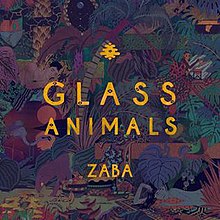Zaba (album)
| Zaba | ||||
|---|---|---|---|---|
 |
||||
| Studio album by Glass Animals | ||||
| Released | 6 June 2014 (UK) 17 June 2014 (US) |
|||
| Recorded | Wolf Tone Studios (London, United Kingdom) | |||
| Genre | ||||
| Length | 45:31 | |||
| Label | Wolf Tone, Caroline International, Harvest Records | |||
| Producer | Dave Bayley, Paul Epworth (exec.) | |||
| Glass Animals chronology | ||||
|
||||
| Singles from Zaba | ||||
|
||||
| Professional ratings | |
|---|---|
| Aggregate scores | |
| Source | Rating |
| Metacritic | 77/100 |
| Review scores | |
| Source | Rating |
| AllMusic | |
| Clash | 8/10 |
| DIY | |
| Drowned in Sound | 5/10 |
| NME | 8/10 |
| Paste | 9.0/10 |
| Q | |
| Uncut | |
Zaba is the debut studio album by English indie rock group Glass Animals, released on 6 June 2014 by Wolf Tone/Caroline International and on 17 June 2014 by Harvest Records in the U.S.
Interest first arose in Glass Animals after the release of their debut extended play Leaflings on independent label Kaya Kaya Records, a subsidiary and imprint of XL Recordings, part of the Beggars Group of labels. After they became the first act to be signed to Wolf Tone, the record label of British producer Paul Epworth, they released their second, self-titled EP. A song from the EP, "Black Mambo", in addition to a re-recorded version of "Cocoa Hooves" from Leaflings, appears on Zaba, expanding the promotion of the album. Glass Animals also gained exposure in Europe by playing opening act on European shows of St. Vincent, Metronomy, Yeasayer and others.Zaba performed particularly well on the Australian charts, following three headline shows in the country and an appearance and regular airplay on Australian radio station Triple J. The album reached number 12 on the ARIA Charts.
Zaba is primarily a psychedelic indie pop record. The album's sound is characterized by obscure tropical percussion and jungle timbres. This musical motif reflects lead singer David Bayley's exotic subject matter, which was inspired by the William Steig children's book The Zabajaba Jungle. To achieve this sound, Bayley would record ambient sounds of a field near his house or the chewing of rabbits and other animals, and percussive sounds of cooking utensils and children's toys. Some of the songs were based specifically on certain adventure novels: "Toes," for example, intends to recreate the atmosphere of The Island of Doctor Moreau and Heart of Darkness.
...
Wikipedia
